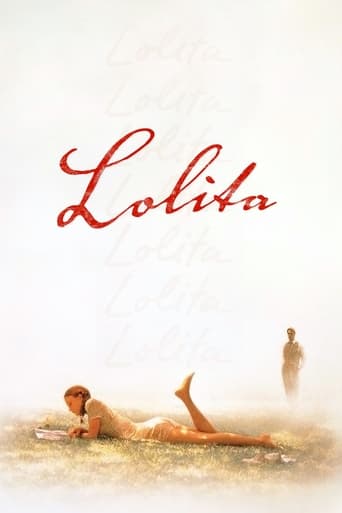

Is it bad that I really, really enjoyed this? I wasn't expecting it, even. There is significant grounds for arguing that this movie glamorizes pedophilia, and I don't blame you if it turns your stomach. But somehow, it builds up to be very moving, particularly when he gives her all the money at the end. When this movie was over, I only wanted to start it over again. It was like seeing in black-and-white all your life, then suddenly you can see colors. I'm surprised too. It may disturb you, but you will never forget it, I guarantee. The period detail lends it a timeless artfulness. It is set up and shot beautifully--I wanted to live in Mrs. Haze's house. Ennio Morricone's score did that rare thing, a marriage of music and story that makes me really choked up. It sounds like one of the themes from Sense and Sensibility!The actors, namely the two leads, really bring their A-game. Dominique Swain's performance complicates the story by giving Dolores a character beyond that of rape victim. She is trying to meet Humbert on his own level. I'm not saying this version of him is blameless--he does hit her! But this does raise an interesting question: Let's say there was mutual attraction. What do you do with that? There's no easy answer. Back when I was in that age range, if a gorgeous older English man moved into my house, I wouldn't have had the scruples to stay away from him. I know that much. Hey, reality doesn't always fit our lofty ideals of morality, and this movie proves it. As compelling as Swain is, Irons just might carry the film. This is the perfect sort of role for him. Kudos to whoever decided to keep showing him in a wife-beater. I watched this and not the '62 movie because I just love him so much. Regardless of other versions of this story, this one makes you buy into it and worry for the leads, quite a feat. There are parts where the directing goes off its hinges and the tone gets silly and over-the-top, but these parts are brief. In short, give this a chance, if you know you can stomach it. A new favorite of mine. How does this have the same average rating as Basic Instinct?!?!?
... View More"A man marries his landlady so he can take advantage of her daughter." - The worst description of this movie possible, lie that gives completely wrong picture what you can expect to see in this film.Disturbed, but at the same time very romantic and sad love/life story, much much better than original novel by Nabokov. Maybe my favorite movie of all time.20/10"She was Lo, plain Lo in the morning, standing 4'10 in one sock. She was Lola in slacks. She was Dolly at school. She was Dolores on the dotted line. In my arms, she was always Lolita, light of my life, fire of my loins, my sins, my soul, Lolita.""I was a daisy-fresh girl and look what you've done to me. I should call the police and tell them that you raped me, you dirty old man""Despite all the danger and hopelessness of it all, I was in paradise, paradise whose skies were the color of hell flames, but a paradise still."
... View MoreJeremy Irons proved to be a better choice than James Mason was in Kubrick's version. It's the kind of film that proves that a small story can be much more meaningful than a larger one. The colors are amazing and seem to follow the mood of the story. The highlight is the last scene in which Humbert surrenders. The cinematography is stark and bare, with only the soundtrack adding some effect. From an artistic standpoint, there were some plot elements and character developments I didn't think were totally needed. They do however drive the story, which seemed to be their purpose, so I can accept them. Nothing to laugh at.
... View MoreVery good film, Fully of funny moments and perverted scenes. I think this film is every mans guilty pleasure.Good old Humbert tries to resist his urges but ultimately succumbs to the sweet advances of Lo.the antagonist is debauched playwright Quilty (Frank Langella) and his appearance amid the pale fire of exploding bug-zappers really is very amusing.There are about 8 deleted scenes on youtube which I cant understand why they didn't put them in, you get to see more of Humbert's funny quips and perversion.Highly recommended movie!
... View More